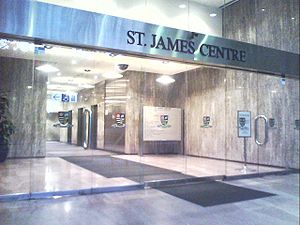
Police Integrity Commission
Encyclopedia
The Police Integrity Commission was established in 1996 upon the recommendation of the Royal Commission in to the New South Wales Police Service. The commission is a corporation established by the New South Wales Government to prevent, detect and investigate alleged serious misconduct in the New South Wales Police Force. It was established on 1 July 1996.
. That recommendation, among others, led to a radical transformation of the police service in New South Wales. The commission can be seen as the successor to the royal commission, although the commission's powers and duties are far more extensive than those granted to the royal commission.
The Commission only looks into serious police misconduct and can refuse to investigate. There is no other body or Commission that looks into police misconduct except for the Police Ombudsman. However, the Police Ombudsman, as a matter of procedure, will refer any complaints made about police or unsatisfactory police investigations back to the area command or the investigating officer.
The commission employs a variety of experienced staff including lawyers, accountants, police, investigators and analysts. Where police officers are employed, they are employed from overseas or interstate.
The commission has extensive powers to summons witnesses and require the production of documents by third parties in relation to an investigation. The commissioner may issue a warrant for the arrest of a witness who does not appear in answer to a summons. The commissioner may direct that a prisoner be brought out of prison to be examined. The commission may also issue search warrants to search and seize property.
 The commission may conduct public or private hearings depending on the nature of the allegations. A hearing may be partly heard in private and partly in public.
The commission may conduct public or private hearings depending on the nature of the allegations. A hearing may be partly heard in private and partly in public.
The commissioner has the discretion to allow persons to appear and take part in a hearing. There is no automatic right of appearance.
Similarly, the commissioner may allow a person to be legally represented. Generally, the commission must give a person giving evidence the opportunity to be legally represented.
Level 3, 111 Elizabeth Street, SYDNEY NSW 2000
Telephone: (02) 9321 6700
Fax: (02) 9321 6799
Postal Address:
GPO BOX 3880, SYDNEY NSW 2001
of their functions. The committee may report to both Houses of Parliament on any of those matters raised. The committee also examines each annual report and other report of the commission and of the Inspector and report to both Houses of Parliament on any matter arising out those reports. The committee may also examine trends and changes in police corruption, and practices and methods relating to police corruption, and report to both Houses of Parliament any changes which the Joint Committee thinks desirable to the functions, structures and procedures of the Commission and the Inspector. Lastly, the committee may inquire into any question in connection with its functions which is referred to it by both Houses of Parliament, and report to both Houses on that question.
The members of the committee as at 30 June 2006 were:
.
History
The commission was set up following a recommendation by the Royal Commission into the New South Wales Police ServiceRoyal Commission into the New South Wales Police Service
The Royal Commission into the New South Wales Police Service was held in the State of New South Wales, Australia between 1995 and 1997. The Royal Commissioner was Justice James Roland Wood...
. That recommendation, among others, led to a radical transformation of the police service in New South Wales. The commission can be seen as the successor to the royal commission, although the commission's powers and duties are far more extensive than those granted to the royal commission.
The Commission only looks into serious police misconduct and can refuse to investigate. There is no other body or Commission that looks into police misconduct except for the Police Ombudsman. However, the Police Ombudsman, as a matter of procedure, will refer any complaints made about police or unsatisfactory police investigations back to the area command or the investigating officer.
Constitution
The commission is established under The Police Integrity Commission Act 1996 (NSW). That act sets out the principal functions of the Commission. They include:- preventing, detecting or investigating serious police misconduct;
- managing or overseeing other agencies in the detection and investigation of serious police misconduct and other police misconduct; and
- manage matters not completed by the Royal Commission into the New South Wales Police ServiceRoyal Commission into the New South Wales Police ServiceThe Royal Commission into the New South Wales Police Service was held in the State of New South Wales, Australia between 1995 and 1997. The Royal Commissioner was Justice James Roland Wood...
.
The commission employs a variety of experienced staff including lawyers, accountants, police, investigators and analysts. Where police officers are employed, they are employed from overseas or interstate.
The commission has extensive powers to summons witnesses and require the production of documents by third parties in relation to an investigation. The commissioner may issue a warrant for the arrest of a witness who does not appear in answer to a summons. The commissioner may direct that a prisoner be brought out of prison to be examined. The commission may also issue search warrants to search and seize property.
Hearings

The commissioner has the discretion to allow persons to appear and take part in a hearing. There is no automatic right of appearance.
Similarly, the commissioner may allow a person to be legally represented. Generally, the commission must give a person giving evidence the opportunity to be legally represented.
Address
St James CentreLevel 3, 111 Elizabeth Street, SYDNEY NSW 2000
Telephone: (02) 9321 6700
Fax: (02) 9321 6799
Postal Address:
GPO BOX 3880, SYDNEY NSW 2001
Parliamentary Joint Committee
A parliamentary joint committee has a statutory oversight over the commission. This includes monitoring and reviewing the exercise by the Commission and the Inspector of the Police Integrity CommissionInspector of the Police Integrity Commission
The Inspector of the Police Integrity Commission is a statutory position which oversees the Police Integrity Commission in New South Wales, a state of Australia.The principal functions of the inspector are to:...
of their functions. The committee may report to both Houses of Parliament on any of those matters raised. The committee also examines each annual report and other report of the commission and of the Inspector and report to both Houses of Parliament on any matter arising out those reports. The committee may also examine trends and changes in police corruption, and practices and methods relating to police corruption, and report to both Houses of Parliament any changes which the Joint Committee thinks desirable to the functions, structures and procedures of the Commission and the Inspector. Lastly, the committee may inquire into any question in connection with its functions which is referred to it by both Houses of Parliament, and report to both Houses on that question.
The members of the committee as at 30 June 2006 were:
- Mr Paul Gerard LynchPaul Lynch (politician)Paul Gerard Lynch MP, an Australian politician, is a member of the New South Wales Legislative Assembly representing Liverpool since 1995 for the Australian Labor Party.-Early career and background:...
, MP, Member for Liverpool (Chairperson) (ALP) - The Hon Jan Burnswoods, MLC (Vice-Chairperson) (ALP)
- Mr Malcolm John Kerr, MP, Member for Cronulla (LIB)
- Ms Lee Rhiannon, MLC (The Greens)
- The Hon David Clarke, MLC (LIB)
- Mr Steven Chaytor, MP, Member for Macquarie Fields (ALP)
- Mr Geoffrey Corrigan, MP, Member for Camden (ALP)
Inspector of the commission
The act provides for the appointment of an inspector of the commission. The inspector is an independent person of the commission has the authority to investigate complaints against the commission. For further information, see the Inspector of the Police Integrity CommissionInspector of the Police Integrity Commission
The Inspector of the Police Integrity Commission is a statutory position which oversees the Police Integrity Commission in New South Wales, a state of Australia.The principal functions of the inspector are to:...
.

